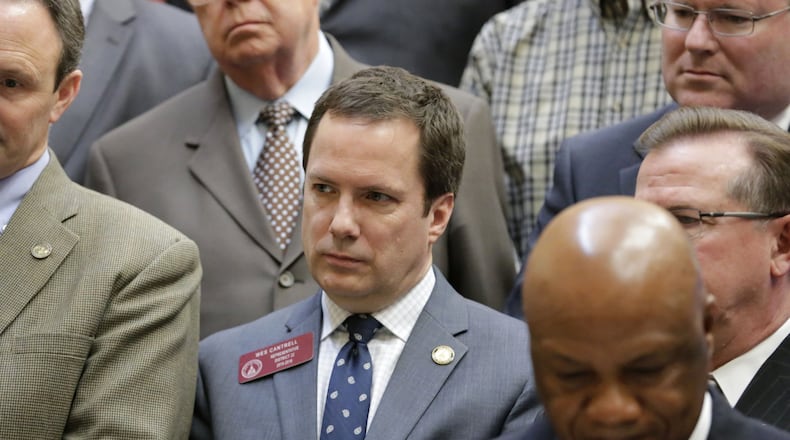Georgia’s children need to know what to do if they are being sexually abused.
That's the thinking behind one of several bills that address child sexual abuse in this legislative session. House Bill 762 mandates annual education on awareness and prevention of sexual abuse and assault for public school students in kindergarten through their freshman year of high school. Rep. Wes Cantrell, R-Woodstock, the sponsor, said at a legislative hearing Thursday that children often don't know whom to turn to when they are abused.
“They go through years enduring something they should not have to endure,” said Cantrell, who acknowledged that teachers may need training to address this sensitive topic. “There’re probably a lot of teachers out there who are going to say, ‘Whoa, I need help with this,’ ” he said. But 31 states states already mandate such education for students.
In an interview, Cantrell said he was motivated to introduce the bill by several factors. He knows a fellow lawmaker whose grandchild was abused. He was moved by the trial of serial child molester Larry Nassar, the former USA Gymnastics national team doctor, especially by testimony that the parents of one girl didn’t believe her when she told them what Nassar had done to her. And he was pushed by a woman who was sexually abused as a child and has been emailing him ever since he was elected more than three years ago.
Erin Merryn has been pushing states, starting with her own Illinois, to adopt these school education programs. The founder of the Erin's Law nonprofit couldn't be reached for comment, but in a video on her website, she says she was sexually abused first by a friend's uncle and later by a cousin. Both told her to keep it a secret and that no one would believe her anyway if she divulged what had happened.
“So I stayed silent because my only education came from these perpetrators,” she says. “Legislators, parents, teachers: They need to wake up and realize that this is going on. You all know somebody that this has happened to.”
It's unclear how many victims are out there. The U.S. Department of Health and Human Services reports that in 2013 there were 60,956 reported cases of child sexual abuse, with 306 in Georgia. But Cantrell repeated an oft-cited estimate that one in four girls and one in six boys are sexually abused.
His is one of several pieces of legislation aimed at the problem this year. House Bill 655 requires schools to post signs with phone numbers where child abuse can be reported. House Bill 32 prohibits sexual contact between all employees at a school and the students there including those over the age of consent. (Currently, it is only illegal for teachers and school leaders to have sexual contact with students age 16 or older at the same school.) And House Bill 605, by Rep. Jason Spencer, R-Woodbine, extends the statute of limitations for lawsuits by child victims to age 38 from the current 23.
Spencer told lawmakers at a hearing Monday that the age extension is needed because most don’t reveal they were abused until well into adulthood, after they realize the emotional and psychological toll it’s taken on their lives.
Lisa Hill Jamison, 53, told lawmakers at the hearing that she’d been sexually abused repeatedly as a child by a close family member. She told a pastor, but he dismissed her. She came to accept the abuse as normal, though it haunted her into adulthood.
She’s been divorced twice, she cringes when she sees little pickup trucks, she feels compelled to shut the blinds whenever the sun goes down, and she finds it hard to sleep. Only with time and counseling has she come to recognize that these were linked to her childhood: She was molested repeatedly in a blue Toyota pickup, her abuser stared at her through her bedroom window when she was undressing and he often came into her room when she was sleeping.
“The psychological damage has carried over into almost every part of my life,” she said in an interview. “I want other little girls to not have to go through what I did.” She told the lawmakers Monday that survivors of childhood sexual abuse need more time than the current law allows to process what happened and to muster the courage to act against their abusers: “We survive by avoidance.”
About the Author
Keep Reading
The Latest
Featured



